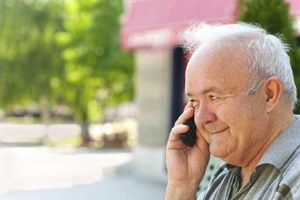Almost everyone who has an elderly parent living alone has gone through this scenario. You call and there’s no answer. You try again later, maybe a few times – still no answer. You start to worry. What do you do at that point?
If you live or work nearby, you probably hop in the car and drive over, only find out that there’s no problem. After all, there are a thousand reasons not to answer the phone that have nothing to do with a health emergency. If you live far away, you might call one of your parent’s local friends (if you know their number) or perhaps the local police department to check on them. Again, there’s usually no problem, except for the inconvenience to everyone involved.
But if there was a problem , how much time elapsed before help arrived?
Many people face this dilemma all too frequently. Fortunately, there are things you can do to enhance senior safety and bring yourself peace of mind.
Fall Prevention
Falls are a serious hazard to senior safety. According the to the Centers for Disease Control, 56,000 adults over 65 died from falls in 2013. While not all falls result in death, one out of every five results in serious injury. When a person is injured in a fall, they often can’t get to a phone to call for help, compounding the danger.
One of the first steps toward ensuring an elderly person’s physical safety, then, is to reduce the risk of falls by taking these steps:
Repair broken or uneven stairs
Install grab bars and seats in showers
Install railings on both sides of stairs
Remove throw rugs that could be a trip hazard
Keep electrical cords out of pathways
Install more lighting and brighter bulbs for better visibility
Remove clutter
Medical Alerts
While these steps will prevent many falls, they don’t cover all the bases. Elderly people can still fall due to dizziness, lack of strength or coordination, or other reasons. Once an elderly person has fallen, there is a good chance they will need help to get up even if they are not seriously injured.
How can you assure that help will be there?
A medical alert system is effective, costs little, and is simple to use. Most systems are activated with a pendant that can be worn around the neck or on a belt. If the user falls or needs help for other reasons, he or she just presses a button on the pendant to summon friends, neighbors, or emergency personnel. Most systems have battery backup, so they work even during a power outage, and some have enough range so that they will work even outdoors on the same property. More advanced systems offer full two-way communications and function like a cordless phone. This enables the user to answer incoming phone calls from the pendant, so there’s never a rush to get to the phone – thus eliminating another fall hazard.
Smart Homes are Safer Homes
Smart home automation can also enhance home safety for seniors. They can be set up to automatically lock docks, turn on lights, and arm security functions when the resident enters the home, or turn lights on and off as he moves from room to room. Of course, smart home systems can integrate a medical alert system. With video integration and cloud-based systems, you can monitor your loved ones remotely from your smart phone or desktop. Wouldn’t that make you rest easier?
For more information about medical alert and smart home systems in Virginia Beach, Norfolk, Chesapeake, Suffolk and all over the Outer Banks, contact Johns Brothers Security: 800-242-9760.
